The Most Loved and Hated Slang Terms

Whether it’s a gamer term, sports jargon or a phrase spawned by teens on TikTok (what does vibing mean anyway?), coming across a piece of baffling new slang is a scenario we’re all familiar with. That’s because, nowadays, slang is a big part of everyday communication, with one in five Americans using slang in all of their conversations and 50% admitting to using slang without knowing what it means.
But where does slang come from? Sometimes, words and phrases are coined or repurposed within a subculture and then creep into the mainstream. Slang can be unique to a country’s culture, which explains why British slang might sound so alien to American ears. So, too, do new generations have a habit of coining slang, with fresh lingo spreading faster these days, thanks to the internet.
This got us thinking: with no formal voting system to vet new words and phrases coming into fashion, how does the world actually feel about particular slang? To find out, our analysts at Letter Solver turned to Urban Dictionary, the internet’s number one decoder of all things slang, in search of the most loved and hated lingo based on user votes. Read on for our findings and to level up (uh, improve) your slang skills along the way.
What We Did
We searched for 205 slang terms on Urban Dictionary to find each entry’s share of upvotes and downvotes. The most loved slang terms are those with the highest share of upvotes, while the most hated count the highest share of downvotes.
Key Findings
- DApp (decentralized application) is the most loved slang crypto term; it’s 100% upvoted on Urban Dictionary
- Gen Z slang like sleeping on (to ignore) and yeet (to throw) are the most loved, while clapback (a witty comeback) and cheugy are among the most hated
- Favorite British slang terms include chuffed (thrilled) and gutted (extremely disappointed); mug (a fool) is the most disliked
- Crypto lingo NGMI (“not gonna make it”) is the most divisive slang term on the internet (6.6% difference between upvotes and downvotes)
DApp is a Universally Loved Crypto Slang Term, While Bitcoin Maximalist is the Most Hated
There’s no better place to kick off our analysis than the world of cryptocurrency, where basic terminology is already confusing enough before slang is thrown into the mix. Our research reveals that DApp is the most loved crypto slang of all, with a 100% share of upvotes on Urban Dictionary. This term is an abbreviation of decentralized application, defined as a computer program that runs autonomously. Bitcoin is an example of a DApp, as it’s an open-source currency that operates without human control.
Also among the most loved slang phrases are paper hands (with a 96.3% share of upvotes) and diamond hands (95.7% upvoted), both of which originated on the popular r/wallstreetbets subreddit. Back in 2021, this forum caused huge waves on the stock market when users encouraged mass-buying of GameStop stock, resulting in a seismic short squeeze. Those who sold their stock early for a profit were labeled paper hands, while diamond hands held onto their stock despite the pressure to sell.
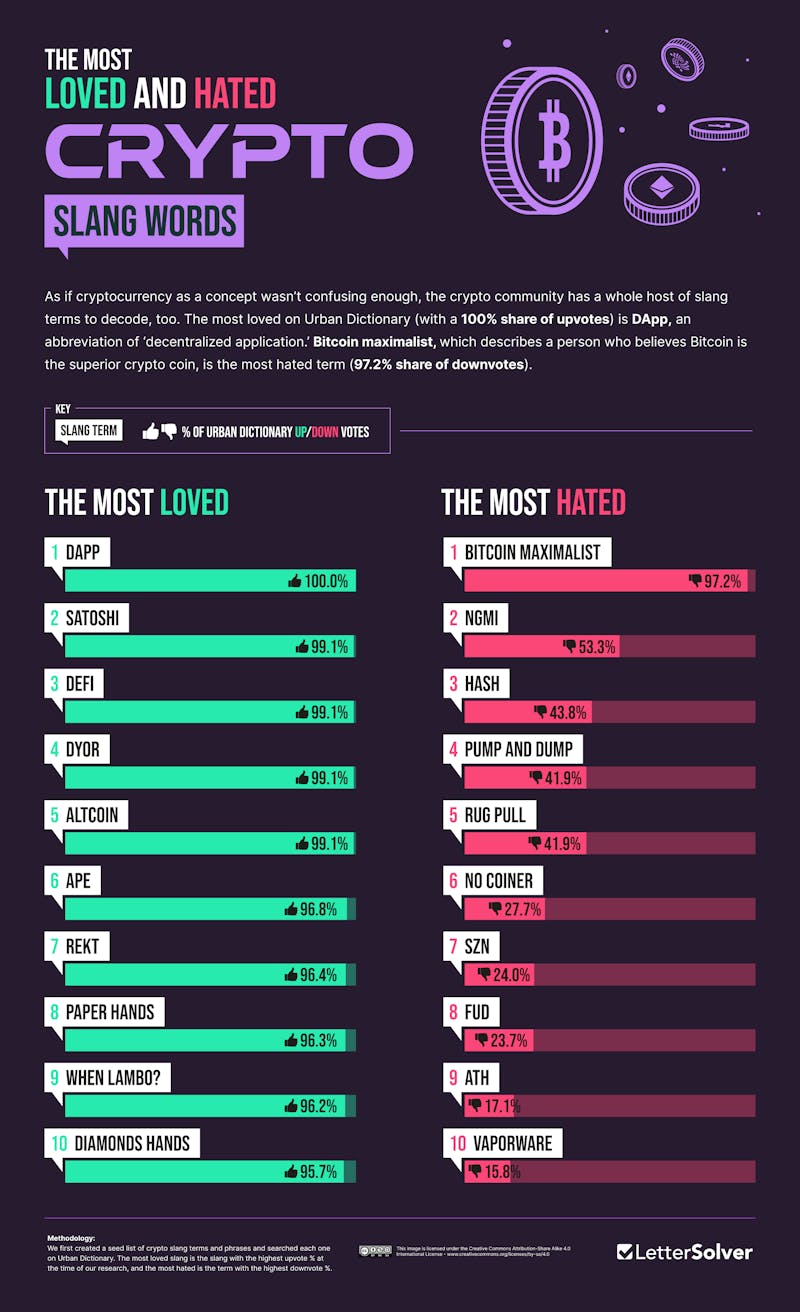
Not all crypto slang has a good reputation online. Bitcoin maximalist is the most hated term, with an almost unanimous (97.2%) share of downvotes. While there are over 8,600 different crypto coins worldwide, a bitcoin maximalist is someone who believes that bitcoin — the most valuable cryptocurrency in the world — is the best, writing the others off as “inferior, distractions or scams.” According to one Urban Dictionary entry for this phrase, maximalists are considered “narcissistic, heavily opinionated and ill-mannered.”
Throwing Wins the Crown for the Most Loved Gaming Slang
With a 94% share of upvotes on Urban Dictionary, our research reveals the most loved gaming slang is throwing, defined as not playing a game properly on purpose. This may seem counterintuitive, but according to Kotaku, there are lots of reasons why a player might throw a game, from wanting to prove their grit by climbing back up the ranks after a loss to an unsportsmanlike desire to annoy other players.
Next up is meta (93.5% share of upvotes), an acronym describing the “most effective tactics available” to win a game. Wombo combo — the name of a series of in-game moves which went viral back in 2008 following a particularly excitable game of Super Smash Bros. Melee — comes third with a 91.8% share of upvotes.
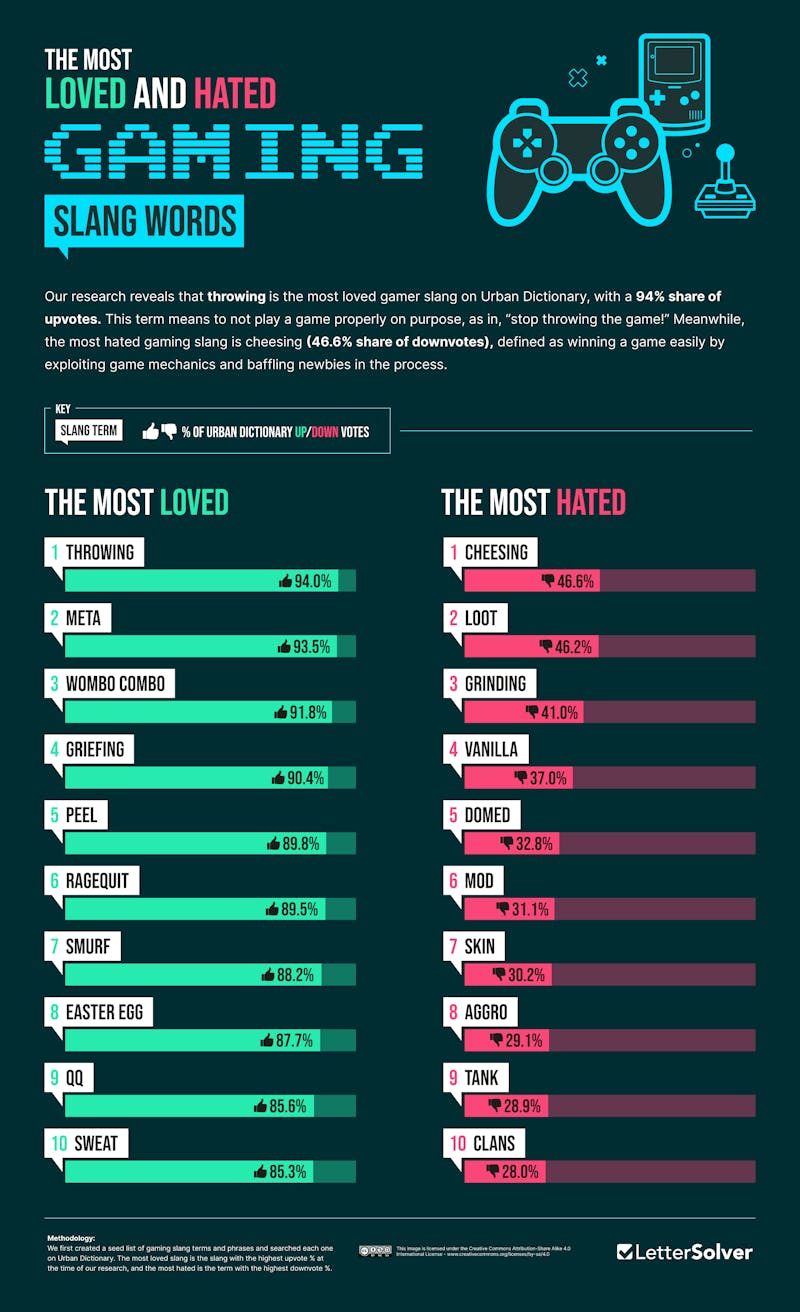
In contrast, cheesing is the most disliked gaming slang, with a 46.6% share of downvotes. Labeled gaming’s “most despised strategy” by Inverse, cheesing describes winning a challenge with a minimal amount of effort by exploiting the game’s mechanics or design flaws. It’s a sneaky tactic as old as computer games themselves; journalist Keith Stuart remembers continuously using (aka spamming) the same move to beat an opponent in the game The Way of the Exploding Fist back in 1985.
Urban Dictionary Feels the Love for Cuffing Season
When it comes to slang in the realm of relationships, cuffing season is the most loved, claiming a 97% share of upvotes on Urban Dictionary. Defined by Merriam-Webster as the period between October and Valentine’s Day, cuffing season sees summer’s singletons reopen their dating apps in search of a partner to cozy up to as the nights draw colder. The phrase reached new heights of popularity in December 2022 when singer SZA’s Saturday Night Live song on the subject took off on TikTok.
Love-bombing is the next most upvoted slang (95.8% upvoted), which describes a manipulative show of affection, followed by situationship (a relationship that’s not quite official yet). Netflix and chill — a euphemism that went viral back in 2015 — has an 89.8% share of upvotes. This phrase means to put on a movie with your partner and… ahem… do something more adult while it plays.
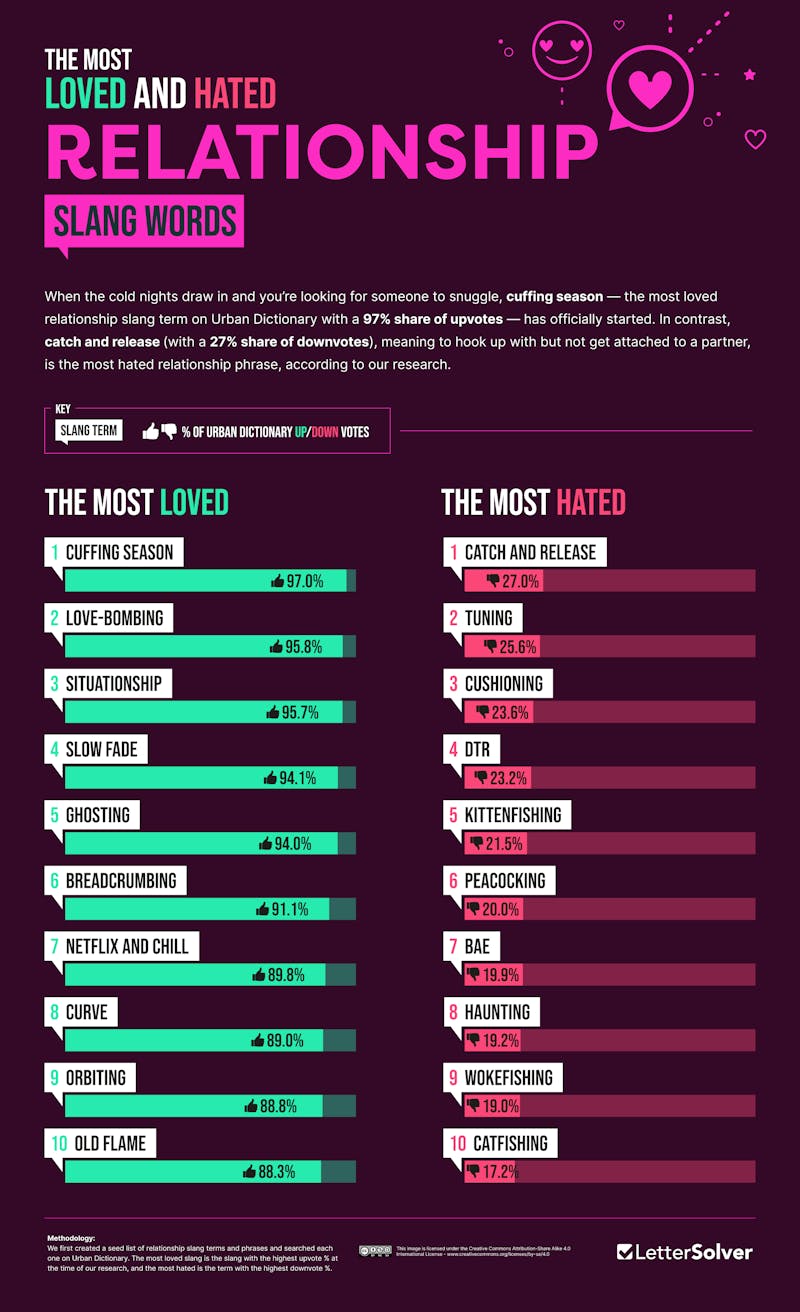
Meanwhile, some relationship slang doesn’t feel the love quite as much. The most hated, according to our research, is catch and release, which has a 27% share of downvotes on Urban Dictionary. An unromantic play on the practice of catching fish and letting them go, this phrase means to hook up with a partner without getting attached.
Speaking of fish, three -fishing verbs appear in our ranking, too: catfishing, wokefishing and kittenfishing. All relate to somehow deceiving a partner you’re dating, which could be why they’re so disliked.
Chuffed is the Most Beloved British Slang, While Mug is the Most Downvoted
For a nation the size of Oregon, the UK boasts an impressively large vocabulary of slang that equally amuses and confuses the rest of the world. But which phrase, in particular, is the internet’s favorite? We found that chuffed comes up top with a 96% share of upvotes on Urban Dictionary, and it means to be particularly happy about something. This word somehow originates from the obsolete word “chuff,” meaning swollen with fat.
Next on the list is gutted (94.7% share of upvotes), a feeling the polar opposite of chuffed; you’ll hear someone say they’re gutted if they’re disappointed or sad. Zonked (meaning extremely tired, see knackered) ranks third, and the quirky phrase Bob’s your uncle — meaning “there you have it” — also appears with a 90.3% share of upvotes.
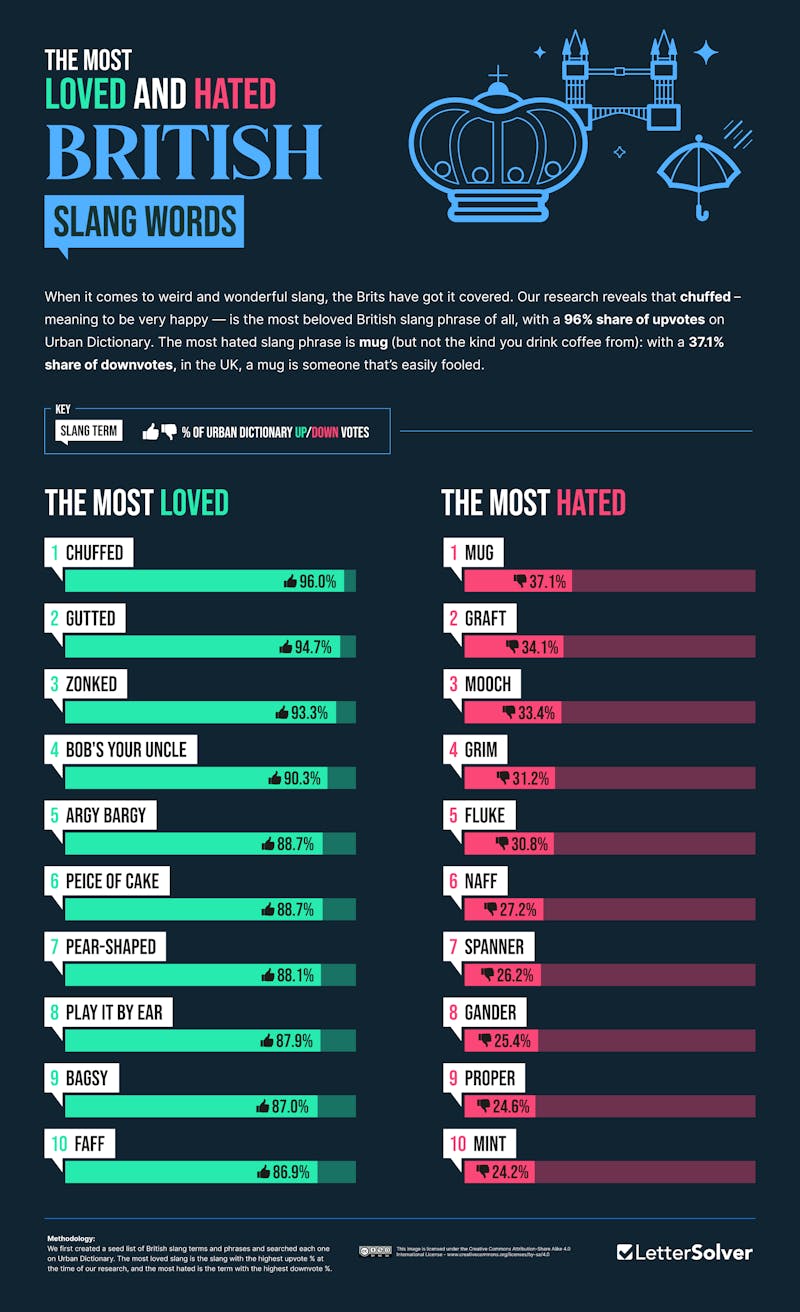
Non-Brits may see some words they recognize in our most hated slang ranking, but don’t breathe a sigh of relief just yet — they naturally translate differently across the pond. The most hated term with a 31.7% share of downvotes is mug, meaning a fool, and in the wild or any good cockney film, you might hear it phrased as “mug me off” (as in, “making a fool of me”).
Third on our list is mooch (33.4% downvoted), which can mean both a freeloader (matching the American definition) or an aimless, relaxing walk (e.g., “I’m going to mooch around town.”). Mint, meanwhile, can be used to describe something great in the UK, and gander means to take a look.
LeBronning is the GOAT of Sports Slang, While Bronx Cheer Loses Out
The most loved sports slang in our research is LeBronning (90.4% upvoted), meaning to fake an injury on the field or court. The term paints an unflattering picture of its namesake LeBron James, labeled a “world-class flopper” (i.e., frequent faker of injuries) by the sports blog SB Nation. Back when Vine was a thing, the viral LeBronning trend saw people fake an over-the-top fall after a minor bump.
GOAT comes next with an 87.6% share of upvotes, an acronym for “greatest of all time.” Coined by rapper LL Cool J in 2000, this phrase can describe not only all-star athletes but high-achievers in any field. On social media, you’ve likely seen the goat emoji (🐐) serving in the full word’s place, as sometimes even the shortest words take too long to type.
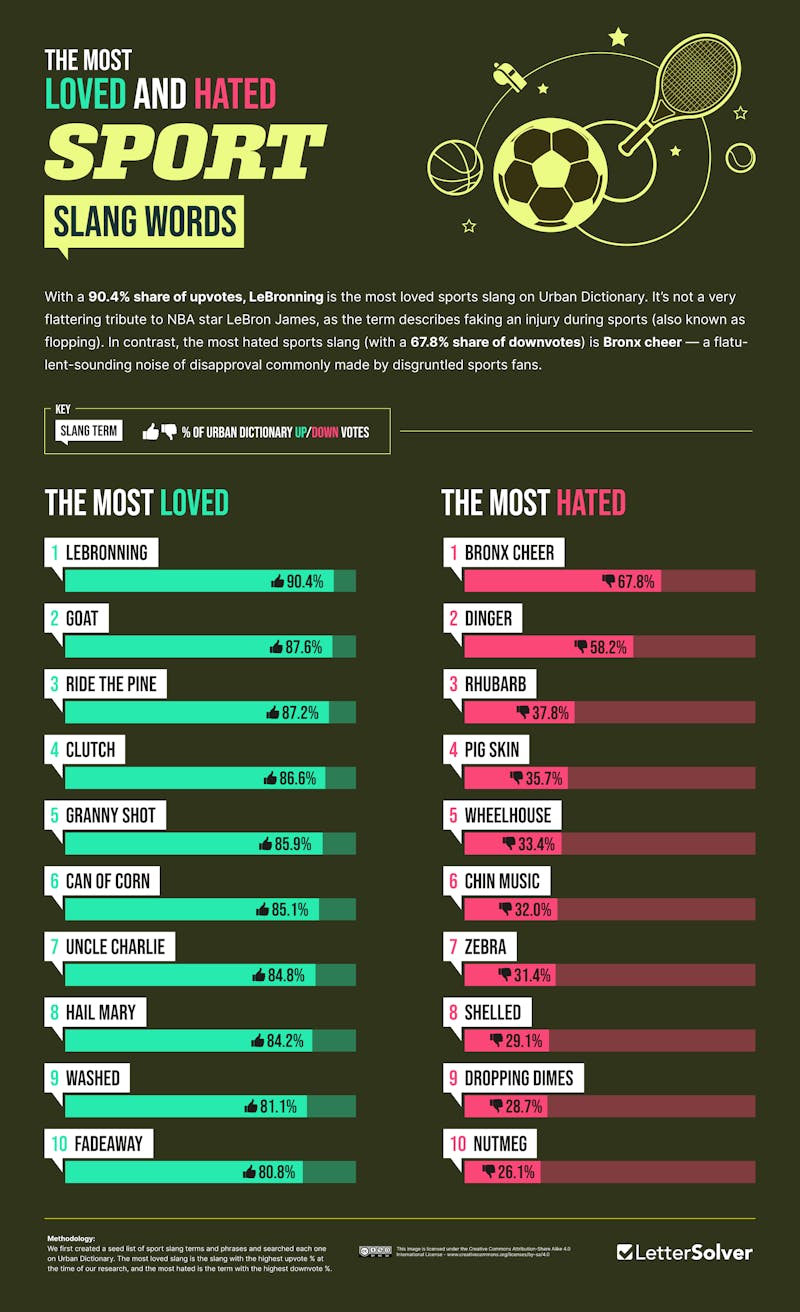
Meanwhile, the most hated sports slang is Bronx cheer (67.8% downvoted), describing a flatulent-sounding noise (also known as a raspberry) made by jeering sports fans. Dinger (58.2% downvoted) comes up next, which baseball fans will know means a home run. While the official origin of this word is unclear, according to Sports Lingo, it’s theorized to be a shortened version of humdinger (meaning a very good thing).
Don’t Sleep on Sleeping on — it’s the Most Loved Gen Z Slang Phrase
Apart from newly creaking joints, nothing has the potential to make you feel your age more than hearing the new kids on the block spout their slang. While there’s a whole range of incomprehensible Gen Z slang to decode, the most loved is sleeping on (93.9% upvoted on Urban Dictionary), meaning to ignore something or someone that has the potential to be high-achieving, e.g., “don’t sleep on them.”
The next most loved slang term is yeet (93.2%), which began life as the name of a viral dance but evolved to mean throwing something, followed by catch these hands with a 93.1% share of upvotes. Far from an invitation to dance, someone telling you to catch their hands is looking for a fight.
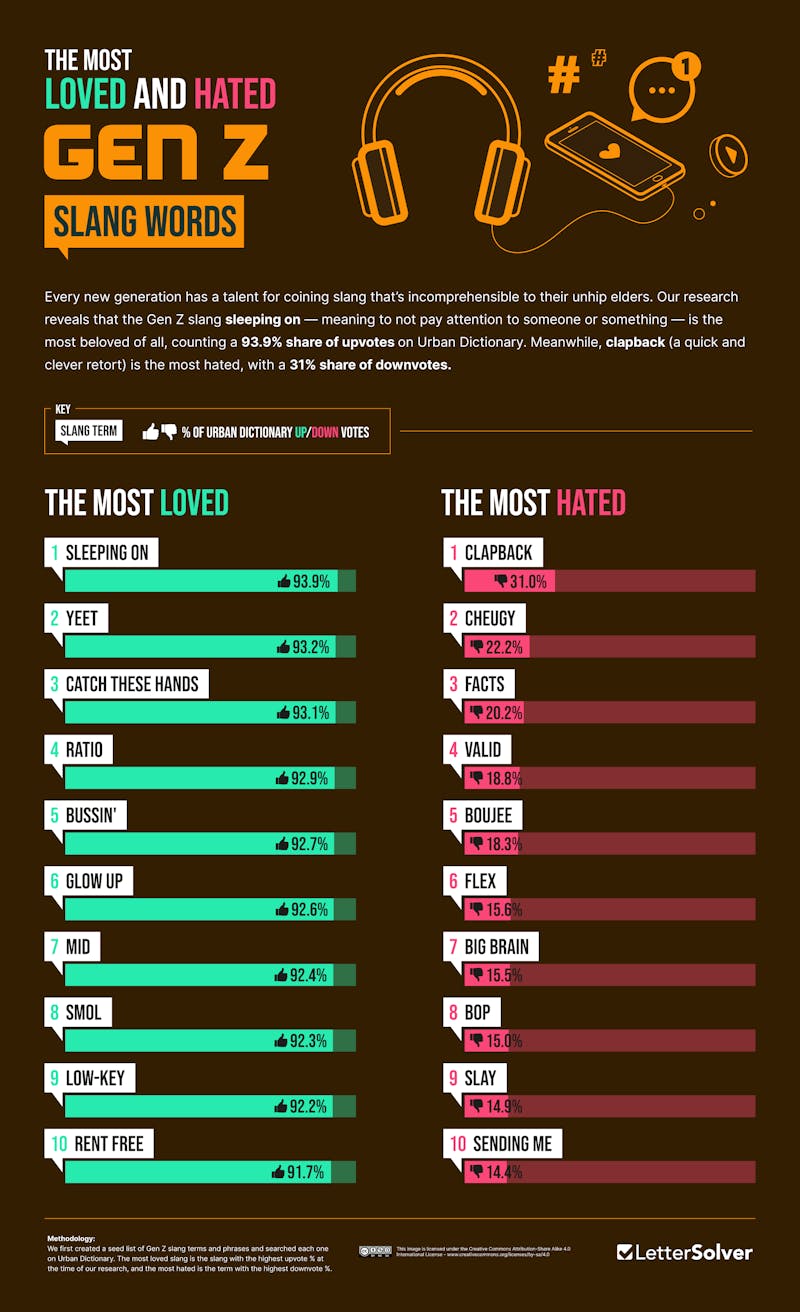
The most hated Gen Z slang term is clapback, with a 31% share of downvotes, defined as a clever retort to an insult. You may have seen celebrities like Cher (or their PR teams) serve sizzling clapbacks to trolls on social media (do we sound cool yet?). Next comes cheugy (chew-ghee), which is 22.2% downvoted, and it describes a particular style of fashion and decor that is associated with millennial women. Think uggs, Aztec prints and anything emblazoned with ‘live laugh love.’
The Top 10 Most Divisive Slang Terms
While some slang has united the internet in appreciation or derision, we can’t all agree on everything, and some tricky terms have truly divided the vote-casting users on Urban Dictionary. None more so, however, than NGMI, which counts only a 6.6% difference between its entry’s share of upvotes and downvotes. In the world of cryptocurrency, NGMI stands for “not gonna make it,” often used to describe someone who’s made a poor financial decision.
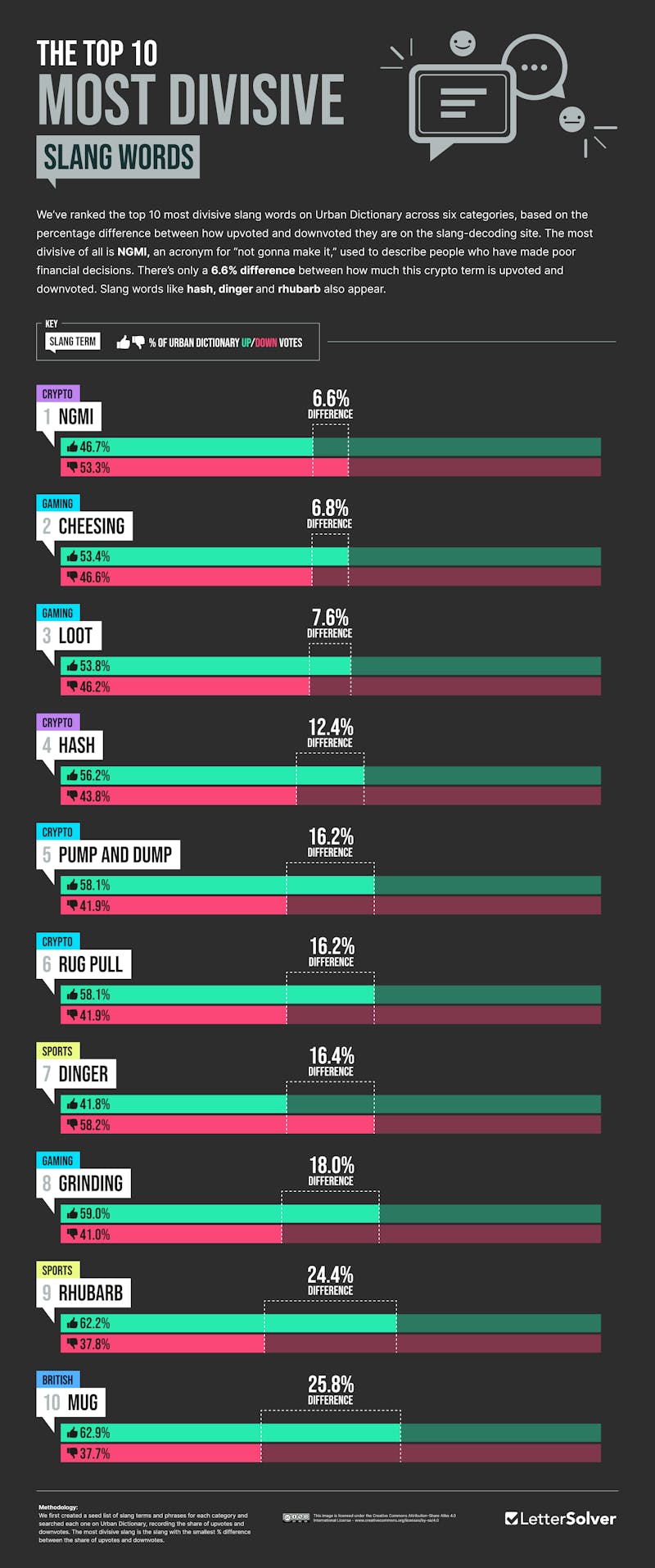
Next come two gaming terms: cheesing (6.8% difference) and loot (7.6% difference). You’ll know cheesing already as a sneaky gaming tactic that divides player opinions on its merits, while loot describes in-game collectible items meant to help the player out, like currency, weapons or health kits. The names of two unethical crypto practices (pump and dump and rug pull) also rank, both counting a 16.2% difference between their shares of upvotes and downvotes.
The Most Loved and Hated Slang Terms on Urban Dictionary
While having a British accent helps if you want to say something like wazzock out loud, you don’t have to be part of a particular community to get to know the lingo. Use our table below to explore all of the 205 slang words we analyzed as part of our research to find out how they’re rated online.
As anyone who’s ever earnestly used a word like tubular will know, slang falls in and out of fashion all the time. Thankfully, as slang keeps evolving, so does technology; nowadays, an internet connection is all you need to translate a slang term so you can deploy it correctly in your next conversation with a sports fan, TikTok teen or crypto enthusiast.
Methodology & Sources
We began by creating a seed list of slang terms for six different categories: crypto, gaming, sports, relationships, Gen Z and British (example of a guide we used to source crypto slang). After curating a total of 205 words across the categories, we looked each one up on Urban Dictionary and found the correct meaning.
We then recorded the number of upvotes and downvotes for each word and calculated the percentage of upvotes and downvotes for each. This allowed us to determine the most loved (highest upvote %) and most hated (highest downvote %) slang terms and phrases for each category. We excluded words from our analysis if they had fewer than 50 total votes.
Finally, we found the most divisive words across all categories by isolating the words with the smallest % difference between upvotes and downvotes.
The data was collected in January 2023.